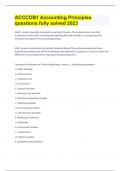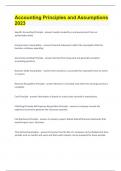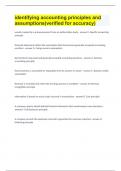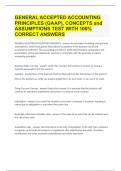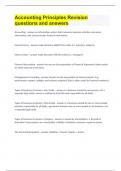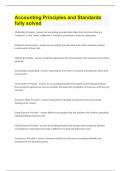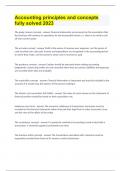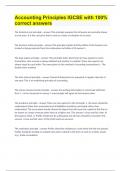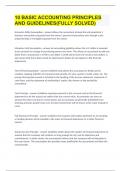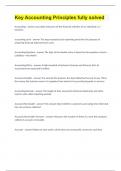Minnesota School Of Business
Latest uploads at Minnesota School Of Business. Looking for notes at Minnesota School Of Business? We have lots of notes, study guides and study notes available for your school.
-
59
- 0
-
4
All courses for Minnesota School Of Business
Latest notes & summaries Minnesota School Of Business
GAAP Generally Accepted Accounting Principles. The standards and rules that accountants follow while recording and reporting financial activities. It encompasses the procedures accepted in the accounting process. IASB International Accounting Standards Board. They actively develop and issue accounting standards that will to be followed internationally. Its purpose is to narrow down the differences in the world when preparing a financial statement. Conceptual Framework of Financia...
Specific Accounting Principle Usually created by a pronouncement from an authoritative body Going-Concern Assumption Financial statements reflect the assumption that the business continues operating General Accounting Principle Derived from long-used and generally accepted accounting practices. Business Entity Assumption Every business is accounted for separately from its owner or owners Revenue Recognition Principle Revenue is recorded only when the earnings pro...
usually created by a pronouncement from an authoritative body E. Specific accounting principle financial statements reflect the assumption that the business generally accepted accounting practices G. Going-concern assumption Derived from long used and generally accepted accounting practices A. General accounting principle Every business is accounted for separately from its owners or owner C. Business entity assumption Revenue is recorded only when the earnings pro...
GENERAL ACCEPTED ACCOUNTING PRINCIPLES Are principles (including concepts and assumptions), which have gained international acceptance in the business world and accountancy profession. The accounting procedures, profit determination, preparation and presentation of financial statements must be in conformity with the generally accepted accounting principles. Business Entity Concept Under this concept, the business is treated, as having a separate personality from the owner/s Example - t...
Accounting an information system that measures business activities, processes information, and communicates financial information. External Users make decisions ABOUT the entity (i.e. investors, bankers). Internal Users make decisions FOR the entity (i.e. managers). Financial Accounting focuses on the preparation of Financial Statements (often useful for those external to the firm) Management Accounting focuses on the preparation of internal reports (e.g. perform...
Materiality Principle An accounting principle that states that only items that are "material" or that "make a difference" should be presented in financial statements Historical cost principle An accounting principle that states that companies should record assets at their cost. Matching Principle recognize expenses in the same period as the revenues they help to generate Accrual Basis Accounting reporting income when it is earned and expenses when they are incurred ...
The going concern concept Financial statements are prepared on the assumption that the business will continue its operations for the foreseeable future; i.e. there is no need to sell off non-current assets The accruals concept Profit is the excess of revenue over expenses, not the excess of cash received over cash paid. Income and expenditure are recognised in the accounting period to which they relate, not the period in which cash is received or paid The prudence concept Cautio...
The historical cost principle This principle requires that all assets are normally shown at cost price. It is the cost price that is used as a basis of valuation of an asset. The business entity principle This principle implies that the affairs of the business are treated as being separate from the nonbusiness activities of its owner/s. The dual aspect principle This principle states that there are two aspects to every transaction. One account is always debited and another is cr...
Economic Entity Assumption Allows the accountant to keep the sole proprietor's business transactions separate from the owner's personal transactions even though a sole proprietorship is not legally separate from the owner. Monetary Unit Assumption An accounting guideline where the U.S. dollar is assumed to be constant (no change in purchasing power) over time. This allows an accountant to add one dollar from a transaction in 1946 to one dollar in 2018 and to show the result as two dol...
Accounting accurately measures all the financial activities of an individual or a business. accounting cycle The steps repeated each reporting period for the purpose of preparing financial statements for users. Accounting Equation The logic of the double entry is based ont his equation: Assets = Liabilities + Net Worth Accounting Ethics A high standard of behavior (honesty and fairness) that all accountants are expected to follow. Accounts Payable The amount the ...

